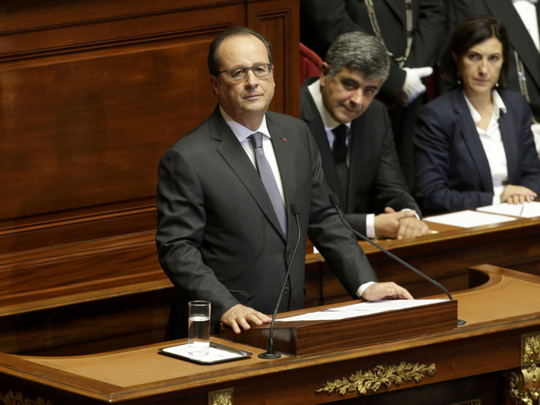
“France is at war”, said Prime Minister Manuel Vals a few hours after the Daesh (the self-proclaimed Islamic State of Iraq and the Levant) attacks that left at least 129 dead.
The country might be at war, but its people hardly know it. France is slowly waking up as it would after a terrible nightmare. One or maybe a few attackers are still at large, raising fears of similar attacks. While one million French people demonstrated in the streets of Paris after the January attack at the Charlie Hebdo office, now everybody is staying at home. The difference with Charlie Hebdo is indeed noticeable: Beyond the number of victims, those hit had nothing in particular to fear — except sharing a credo of human respect and freedom of political and religious expression.
The French state reacted as any responsible state would, including praising the quality of the work by those whose job it is to protect the population. There were hundreds of victims, but probably less than what would have happened if the stadium attack had not failed. Nobody can claim it is an easy task to prevent such carnage being perpetrated by irresponsible brutes manipulated by impotent and cowardly mentors, who know nothing of religion.
France’s population and its political class will gather and mourn its dead — similar to what had happened in January. Demulcent speeches will be made about the need for “national unity” (a section of the media already advocated the creation of a so-called “Government of National Union”). But it won’t be long before one asks the real questions.
France is at a war, but against whom? Daesh, of course (even though their communique raises doubts about their guidance). But more generally, the subtle differences between members of Daesh, Al Qaida, Jabhat Al Nusra and the Muslim Brotherhood, are not likely to survive those dramatic events. Who is fighting Daesh on the ground? The Kurds, who are considered a fierce enemy by Turkey; the Russians and the army of Syrian President Bashar Al Assad, which should not be supported because of its loyalty to a dictator whose practices have obviously alienated it and the Syrian regime from other parts of the region.
Former French president Nicolas Sarkozy summed it up when he said: “France needs to apply some inflexions to its foreign policy”. Times of otherworldliness and denial of reality are over. One of the attackers, it was revealed, was convicted of petty crimes eight times by French Justice between 2004 and 2010, but he did not spend any time in jail. And yet French Minister for Justice Christine Taubira goes on unabated on her silly plans about a more lenient justice system.
‘Religious’ issue
A democracy implies that its rulers do not behave like those who want to destroy it. There is still much to be done in France, still knowing that the 10,000 identified “possibly radicalised Islamists” cannot be confined in a detention camp. But what about the 500 or so who have gone to Syria — thanks to the easy access made available by Turkey. And who since then have returned to France?
Then there is the ‘religious’ issue: Some will indeed rightly argue that those killers, who massacred innocent victims, knew nothing about ‘religion’ or at least about Islam, to which they falsely pretended to belong. It is great that so many Muslim authorities came out with unequivocal condemnation of what happened. But one more time, we did not hear anything yet from the Qatar-based cleric Yousuf Al Qaradawi?
It is true that a ‘victimisation’ process has developed, especially in the West, because of the many successive governments who did not do their job properly, with respect to integration in the social and economic sense. That, however, doesn’t justify a massacre, as it should not be a carte blanche for leaving things and situations unchanged. Education is the first ammunition western states should utilise against the dramatic effects of the present situation, and everyone knows it is a very long road ahead.
In practical terms, France has a complex roadmap to design and implement. It should include a reassertion of some of its foreign policy decisions and increased attacks on Raqqa, which are already underway. It needs to strengthen its domestic policy in terms of basic security. It ought to take a firm decision not to let the enemies of democracy kill democracy. And it needs a decisive move towards that section of the population that has been left isolated. In the end, as Paris Cardinal Vingt-Trois said in his message to the Christians after the attack, “One can never despair of peace if one builds up justice at the same time.”
Luc Debieuvre is a French essayist and a lecturer at IRIS (Institut de Relations Internationales et Strategiques) and the “FACO” Law University of Paris.










